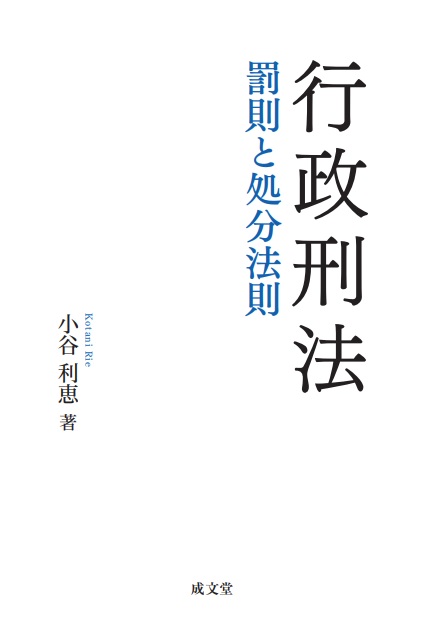
Title
Gyosei Keiho (Administrative Criminal Law: Penal Provisions and the Law of Disposition)
Size
332 pages, A5 format, hardcover
Language
Japanese
Released
April 14, 2021
ISBN
978-4-7923-5325-4
Published by
SEIBUNDO Publishing, Co., Ltd.
Book Info
See Book Availability at Library
Japanese Page
This book aims to elucidate the history of the establishment and transition of penalties under administrative laws and regulations, studied under “administrative criminal law” in Japanese academia by investigating and discussing them from a historical perspective. The research results focus on the period from the beginning of the Meiji era (1868) to the introduction of the former Penal Code (Proclamation 36 of 1880).
Currently, “imprisonment,” “fines,” and “petty fines,” the punishments stipulated in the Penal Code (Act No. 45 of 1907), are often used as means for disposition under administrative laws and regulations. In some cases, “civil fines,” which are non-penal fines, are imposed.
For the former, on the basis of the fact that Article 8 of the Penal Code stipulates that “The general provisions of this Part also apply to crimes for which punishments are provided by other laws and regulations, except when special provisions are provided in such laws and regulations.” it has been understood that the general provisions of the Penal Code and the Code of Criminal Procedure are applied in principle for both administrative and criminal law in Japanese academia.
On the other hand, some precedents do not apply to the general provisions of the Penal Code even though there are no explicit special provisions.
In his book Gyōsei Keihō Gairon (Introduction to Administrative Criminal Law, 1939, Iwanami Shoten), Dr. Tatsukichi Minobe, a pioneer in the study of administrative criminal law, distinguishes such law from the original criminal law and argues that it is necessary to establish special general provisions without applying the general provisions of the Penal Code. Moreover, he states that there are cases wherein the application of Article 8 of the Penal Code should be excluded not only when explicitly excluded by regulations but also as a matter of course in interpretation.
Based on these academic and practical views and the recognition of five issues that arose while reviewing the literature, administrative regulations, and criminal laws, this research focuses on empirically organizing and presenting various points that have not yet been clarified, using a variety of official documents from the early Meiji period and adding explanations with the help of previous research.
It has been clarified that “fines” and “petty fines” stipulated in the penal provisions of administrative regulations have been regarded as application of the punishments stipulated in the Penal Code, but these were originally seen not as a punishment but as a means of disposition inherent in the penal provisions of administrative regulations which, along with civil fines, were drawn up by various government ministries and enforced by local officials. At the insistence of the Ministry of Justice, these fines were transferred to the courts and were treated like punishments. When the former Penal Code was enacted, fines and petty fines were stipulated as punishment. Therefore, fines and petty fines in the penal provisions of administrative regulations practically merged with these. It was recognized at this time that the general provisions of the former Penal Code should not be applied to some penal provisions of administrative regulations, including imprisonment provisions, but it was difficult to finish the work to organize them before the former Penal Code came into effect; hence, the special law was enacted to be consistent with the former Penal Code as a temporary measure of convenience. Then, because of Article 5 of the former Penal Code and Article 8 of the Penal Code, it has become difficult to understand the originality of the penal provisions of administrative regulations, which has continued until today.
The details of these circumstances, combined with their relationships with other legal systems, are surprising and indicate the need to reconsider the legal system related to penalties. This book hopes to understand exactly how the legal system was established and enforced. It also hopes to find in the official documents, which show earnest consultations, the image of officials who care about the state of the nation and the lives of its citizens and residents, in order to become a force that will support academia and the three powers now and in the future.
(Written by: KOTANI Rie / February 22, 2022)
Related Info
The 1st UTokyo Jiritsu Award for Early Career Academics (The University of Tokyo 2020)
https://www.u-tokyo.ac.jp/ja/research/systems-data/n03_kankojosei.html



